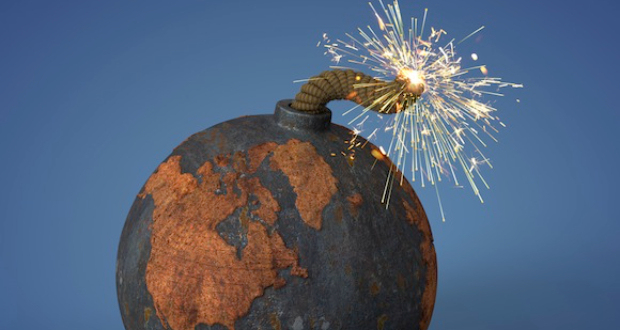The current military-security situation heralds what is likely to be a more dangerous decade, characterised by the brazen application by some of military power to pursue claims – evoking a ‘might is right’ approach – as well as the desire among like-minded democracies for stronger bilateral and multilateral defence ties in response. At the same time, governments are trying to balance appetite for advanced weapons with the need to rebuild industrial-scale ammunition production capacity. The demise of the Conventional Forces in Europe Treaty highlighted a lack of interest in arms control.
Moscow’s military actions have amplified concerns in other parts of the world, particularly the Indo-Pacific, that a militarily powerful neighbour may try to exert its will over others. In Asia, this has driven Japan and South Korea to seek closer defence ties, the Philippines to re-engage with the United States on military cooperation, Taiwan to bolster its defences, and Australia to embark on an unprecedented expansion of its naval capacity, most visibly through the Australia–United Kingdom–US AUKUS partnership with nuclear-powered submarines at its core.
China is becoming more assertive, not just in its immediate vicinity. The country flew a high-altitude surveillance balloon over the US and deployed ships near American shores, while its maritime assets had tense encounters with Canadian and Philippine vessels. Beijing sustained its defence modernisation, while also stepping up diplomatic engagement, brokering an effort at detente between Iran and Saudi Arabia.
Hamas’s surprise attack on Israel on 7 October using a combination of ground fighters, rocket fire and other tactics that killed around 1,200 civilians, and Tel Aviv’s assault on Gaza in the aftermath that caused mass civilian casualties have further upset the global security landscape. The fighting arrested efforts at improving relations between Israel and several Arab states and caused diplomatic rifts further afield. The fighting also exposed a potential overreliance by Israel on technology to monitor Hamas, which may have contributed to Tel Aviv not anticipating the attack.
Regional instability also affected other parts of the world. Africa suffered coups in Niger and Gabon, and military regimes now control a belt across the Sahel. The United Nations ended its Mali operations because of political pressure from the new regime, though violence in the country persisted.
All that happened as the costs to Russia of its ill-judged war crystallised during a second year of fighting. The Wagner Group’s attempted mutiny highlighted the internal fissures within Russia; Ukraine has gradually, even if only slowly, recaptured territory, though not as much as it – and its backers – hoped. At the same time, Russia’s Black Sea Fleet has been badly hit, and Moscow has had to adjust equipment plans to focus on the near-term fight.
Russia’s territorial ambitions also have spurred several governments in Europe to refresh their security thinking. Germany published a first national security strategy, and the UK issued an update to its Defence Command Paper. All made clear that national security is no longer an afterthought and that looming challenges require serious attention. They also highlighted, to different levels, that China is becoming an ever-greater security concern, matching, at least to some extent, Washington’s tone. China’s military developments were also a focus of Australia’s Defence Strategic Review.
The result has been an uptick in defence outlays. Governments from Canberra to Washington to Oslo have also realised their ammunition stocks have fallen too low and the ability to restock needs fixing. A just-in-time mindset that has persisted for almost three decades is giving way to a just-in-case approach, though delivering on these ambitions is challenging.
India targets net-zero carbon emissions by 2070, says Modi

India’s economy will become carbon neutral by the year 2070, the country’s prime minster has announced at the COP26 climate crisis summit in Glasgow. The target date is two decades beyond what scientists say is needed to avert catastrophic climate impacts. India is the last of the world’s major carbon polluters to announce a net-zero target, with China saying it would reach that goal in 2060, and the United States and the European Union aiming for 2050.
COP26: What climate summit means for one woman in Bangladesh

China's carbon emissions are vast and growing, dwarfing those of other countries. Experts agree that without big reductions in China's emissions, the world cannot win the fight against climate change. In 2020, China's President Xi Jinping said his country would aim for its emissions to reach their highest point before 2030 and for carbon neutrality before 2060. His statement has now been confirmed as China's official position ahead of the COP26 global climate summit in Glasgow. But China has not said exactly how these goals will be achieved.
Why China's climate policy matters to us all

China's carbon emissions are vast and growing, dwarfing those of other countries. Experts agree that without big reductions in China's emissions, the world cannot win the fight against climate change. In 2020, China's President Xi Jinping said his country would aim for its emissions to reach their highest point before 2030 and for carbon neutrality before 2060. His statement has now been confirmed as China's official position ahead of the COP26 global climate summit in Glasgow. But China has not said exactly how these goals will be achieved.
Deliver on promises, developing world tells rich at climate talks

A crucial U.N. conference heard calls on its first day for the world's major economies to keep their promises of financial help to address the climate crisis, while big polluters India and Brazil made new commitments to cut emissions. World leaders, environmental experts and activists all pleaded for decisive action to halt the global warming which threatens the future of the planet at the start of the two-week COP26 summit in the Scottish city of Glasgow on Monday. The task facing negotiators was made even more daunting by the failure of the Group of 20 major industrial nations to agree ambitious new commitments at the weekend.
